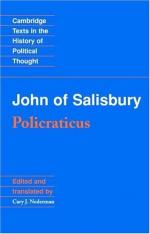|
This section contains 7,741 words (approx. 26 pages at 300 words per page) |

|
SOURCE: Hendley, Brian. “John of Salisbury and the Problem of Universals.” Journal of the History of Philosophy 8, no. 3 (July 1970): 289-302.
In the following essay, Hendley assesses John's contribution to solving the problem of universals and notes that his solution has much in common with that proposed by John Locke five centuries later.
One of the most persistent and vexing philosophical problems in the Middle Ages was that of the nature of universals. Beginning with Boethius' second commentary on the Isagoge of Porphyry, the dispute centered on the question of the existence of genera and species. Are they mere concepts of the mind or can they also be said to subsist? If they subsist, are they corporeal or incorporeal? If incorporeal, do they subsist separated from sensible things or in union with them? Porphyry himself refused to answer these questions because his work was intended for beginners in logic...
|
This section contains 7,741 words (approx. 26 pages at 300 words per page) |

|


